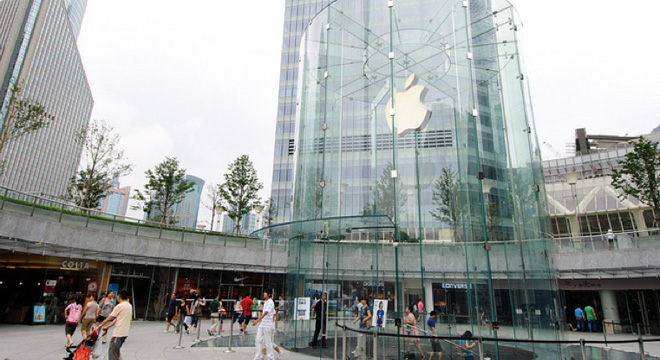Apple isn’t turning the other cheek when it comes to those fake Apple stores proliferating throughout mainland China.
America’s most valuable company was recently granted 37 design patents by the Chinese government, including three for features of its flagship Shanghai Apple store.
Of those, two relate to the distinctive curved glass panels surrounding the staircase that descends into the store and one concerns the overall design of the store, even the side and top-down views, according to the blog Patently Apple (h/t MIC).
Apple has four official retail locations in China and hundreds of other authorized resellers, but the company only became aware of the extent to which unauthorized resellers are springing up in the country in July, when an American expat blogger in Kunming photographed in detail the interior and exterior of one of the fake shops in her neighborhood.
(She was tipped off by the fact that Apple never puts the name “Apple Store” on signs outside its locations, preferring to let the actual piece of fruit logo do the talking.)
Clearly, Apple’s shiny new patents alone aren’t actually going to do much of anything to stop the counterfeiting, especially in China, where the rise of the “grey market” for electronics is far outpacing more legitimate sales. At best, Apple investigators can now file patent infringement claims with the Chinese government when they are made aware of counterfeit gadgets and stores and hope that the subsequent response discourages future would-be copycats.
It’s also worth noting that it’s hardly the first time Apple has sought to protect the look of its stores via intellectual property laws: Apple trademarked its world-famous Fifth Avenue glass cube location last July and, in, an even more meticulous move, in 2003 patented the glass staircase that leads down from the ground to the main floor of many of Apple’s retail locations around the world. As the blog IFO noted:
As simply as the staircases appear to store visitors, an enormous amount of engineering and research went into their design. First, the materials themselves had to be selected and tested to meet load and fire safety requirements. Building codes require certain minimum weight loads for stairways, and in this case the design load was about 100 pounds per square foot (technically 4.5 kiloNewtons per square meter). The glass structures also had to meet certain fire code requirements that limit failure of the components when exposed to flame.
For Apple’s stairs, the glass also had to provide significant seismic protection, since several installations would be in cities with frequent earthquake activity.
Still, not everyone’s a fan of the distinctive glass-heavy designs or Apple’s expansion into China. The company’s new “Apple Experience Center,” set to open within the main campus library at Peking University, Beijing, has been met with resistance from students, who have called it too commercial and “against the spirit of study,” the Global Times reported on Thursday.






